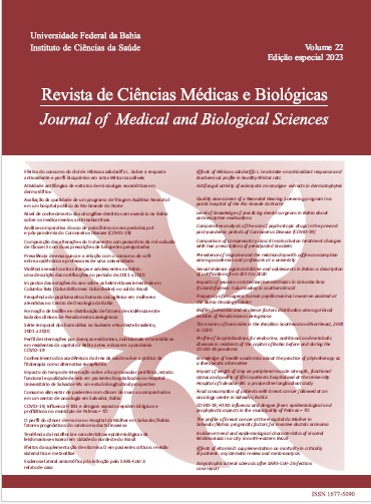Avaliação da qualidade de um programa de Triagem Auditiva Neonatal em um hospital público do Rio Grande do Norte
DOI:
https://doi.org/10.9771/cmbio.v22i4.53409Keywords:
Hearing, Hearing loss, Child health, Unified Health System, Neonatal screeningAbstract
Introduction: Neonatal Hearing Screening (NHS) is essential for identification hearing loss in a timely manner. In Brazil, there are disparities between the programs that provide NHS, pointing to the need to monitor them. Purpose: to evaluate the quality indicators of a NHS program at a hospital located in Rio Grande do Norte. Methodology: this is a retrospective study, using secondary data, whose population consisted of live births, between the years 2015 and 2019. Universality indicators, retest rates, retest follow-up and referral for diagnosis were considered hearing loss, age at completion of NHS, attendance at diagnosis and conclusion and initiation of speech therapy and Hearing Aid (HA) fitting. Percentages and averages were calculated. Results: the average of the universality indicator was 67.2%. As for the retest, there was variation between 6.1 and 10.4%, while the follow-up of the retest ranged from 38 to 65.4% and the referral rate for auditory diagnosis, from 0.8 to 1.5 %. The percentage of neonates who underwent screening before 30 days was 97.4%. Throughout the study period, attendance at the diagnosis and conclusion, initiation of speech therapy and fitting of HA were not achieved. Conclusion: in the investigated program, only the index indicators of retesting, referral for auditory diagnosis and age of completion of NHS are within the recommended range.
Downloads
Downloads
Published
How to Cite
Issue
Section
License
Copyright (c) 2024 Journal of Medical and Biological Sciences

This work is licensed under a Creative Commons Attribution 4.0 International License.
The Journal of Medical and Biological Sciences reserves all copyrights of published works, including translations, allowing, however, their subsequent reproduction as transcription, with proper citation of source, through the Creative Commons license. The periodical has free and free access.


